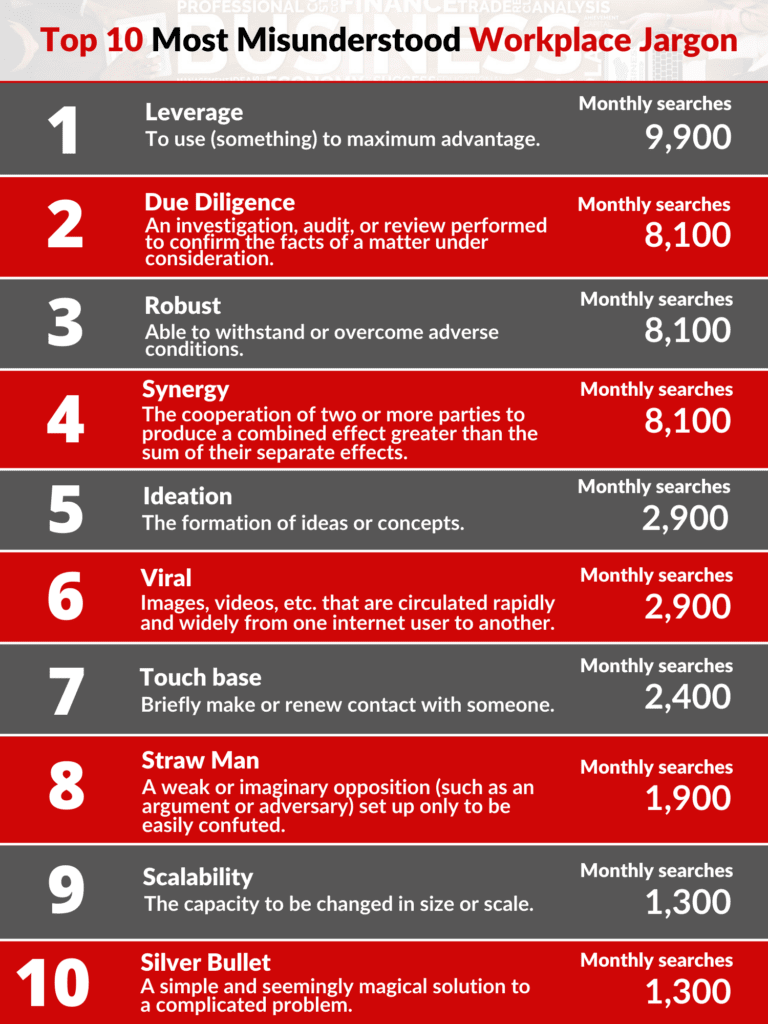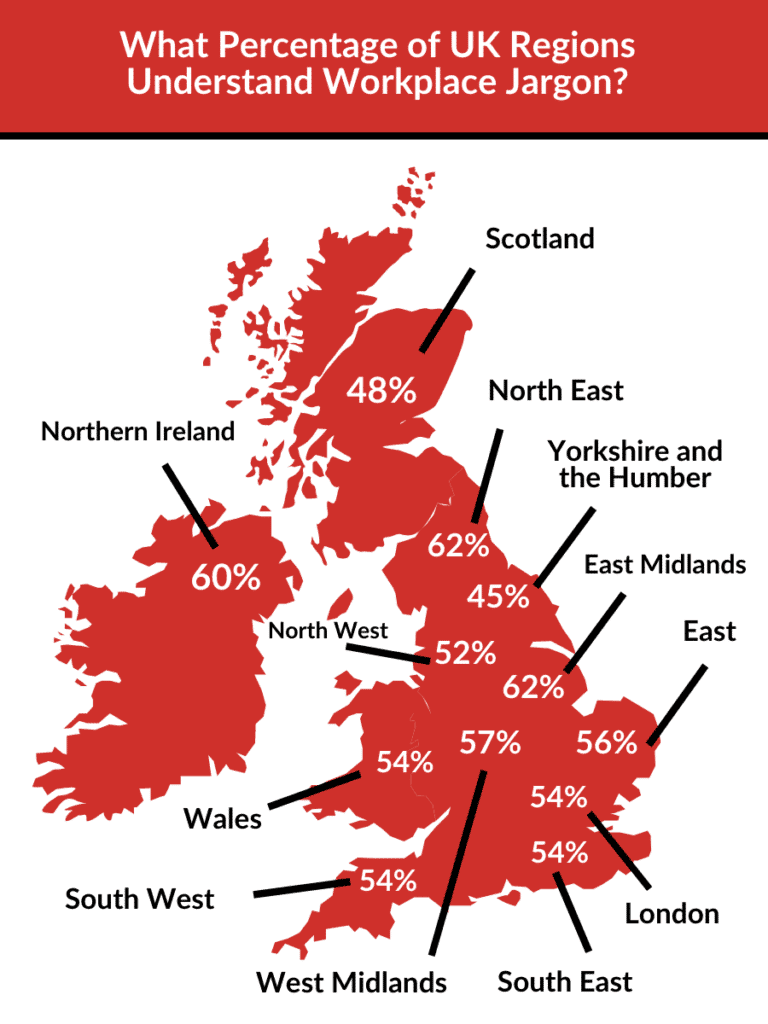The UK’s Most Confusing Workplace Jargon

Business has always been associated with buzzwords, but since the digital revolution, workplace jargon has stepped up a gear. Now, toe-curling terms like ‘touch base’ and ‘blue-sky thinking’ are commonplace – but what do they really mean? And are their days numbered?
A lot of people have a problem with jargon, which, given how cringey some of it can be, is understandable. But as digital transformation reaches its peak and Generation Z enters the workplace, what effect is this having on the words we use day-to-day, and, perhaps more importantly, our understanding of them?
To find out, we launched a quiz challenging people to decipher some of the most confusing words and phrases that have emerged from the workplace. We wanted to know which age group has the best grasp of office jargon, and what it could mean for the future of how we communicate at work.
Then, we took a look at Google search data, exploring just how often people search for the meaning and definitions of different jargon terms. This gave us a clear view of the types of words and phrases people struggle with the most – from ‘synergy’ to ‘silver bullet’.
Let’s take a look at some of the interesting insights our study threw up. And if you’re yet to try our quiz, put your knowledge of business jargon to the test below.
The Top 10 Most Misunderstood Workplace Jargon
While there’s no doubt jargon can be an effective way to get your point across, its use can fall flat when a person has no clue what a word means. And this is a surprisingly common occurrence, with Google search data showing that thousands of people regularly search for the meanings behind different business buzzwords.
But which terms seem to confuse people the most? Take a look at our visual guide below to find out.

It’s funny to think that commonplace terms like ‘leverage’, ‘due diligence’ and ‘viral’ can cause such a headache, garnering thousands of monthly searches on the world’s biggest search engine. Most of the words and phrases in the top 10 are terms people use without thinking about it, which highlights why the language we use in day-to-day life is so important.
Say, for example, you’re onboarding new starters; you’d expect them to know what the term ‘due diligence’ means, and yet the meaning of the term is searched over 8,000 times a month – suggesting that a lot of people aren’t familiar with it.
If this top-10 list of the most confusing workplace terminology tells us anything, then, it’s that even the most everyday business terminology can be misinterpreted. That’s why it’s so important that businesses in all sectors use simple, layman’s terminology wherever possible, helping to make their communications simpler and easier to grasp.
How Well Do Different Age Groups Understand Common Workplace Jargon?
When it comes to understanding business jargon, things get interesting when you look at how well different age groups grasp these corporate-sounding terms. Because while you might expect younger generations to have the best understanding of workplace buzzwords, the results from our study tell a different story – as the visual below shows.
Though there wasn’t much in the results overall, it’s certainly interesting to see the two youngest age groups, Generation Z and Millennials, at the bottom of the pile. Could it be that younger workers are shunning corporate terminology in favour of simpler language? Or is it the case that they don’t yet have the knowledge and experience to pick up words that are often used by senior managerial personnel?
While we can’t know for sure, the divide between young and old age groups does raise questions about what the future might hold for jargon terminology in the workplace. With Generation Z being the least likely to understand commonplace business terms, it’s not beyond the realms of possibility that corporate buzzwords could one day be assigned to the history books.
What Percentage of UK Regions Understand Workplace Jargon?
As well as age, regionality was another interesting area raised by our study. We wanted to know the UK regions most likely to understand corporate jargon, but again, the results were quite surprising.

Before delving into our findings, we had preconceptions about the areas we believed would come out on top – but we were wrong. We would have never guessed, for example, that London would come below several other areas, including Northern Ireland, the North East, and the East and West Midlands.
Why? Because London, with its multi-national corporations, seemed like it would be a hotbed for buzzwords and jargon. But perhaps, given the younger average age of its workforce, the capital isn’t quite as clued up on office jargon as would have been expected.
What Might the Future Hold for Workplace Jargon?
So, the words we use in the workplace, and our understanding of them, are changing. But what does this mean for the future of business jargon? And what, if anything, is responsible for our collective shift away from corporate buzzwords?
Nick Devine, Director at JS3 Global, attributes the death of jargon to two contributing factors: Generation Z’s entry into the workplace, and an increase in remote home working.

Nick says: “Given the current business landscape, it’s no coincidence that jargon is disappearing from the workplace. As an increasing number of roles are filled with young, Gen Z applicants, formal workplace practices and customs are being brought into question – as firms in every sector look to do away with out-dated business models in order to attract young, creative talent.
“This effect has, without question, been bolstered by a huge rise in the number of businesses offering flexible, remote working. As customary business environments switch from the boardroom to the bedroom and home office, the need for corporate lexicon is diminishing, with businesses instead focusing on encouraging collaboration, transparency and sincerity among their teams.”
But while many will rejoice the demise of cringe-inducing terms like ‘touch base’, the issue of jargon disappearing from the workplace does raise questions about how well young professionals understand common terms which may be valuable to their long-term career progression.
On this issue, Nick says: “Technologically-savvy they may be, but the lack of awareness for basic corporate terminology could hurt younger members of the workforce in the long run. That’s why it’s critical that corporate sector businesses continue to reinforce the importance of educating the new workforce on the ins and outs of modern software and terminology – so they can stay abreast of key changes in their industry.”
If you’ve enjoyed this article, take a look at the rest of the JS3 Global blog for more business news, guides and features. If you’d like to learn about our ERP software and business solutions, one of our experienced team will be happy to answer any questions you have. For more information, visit the homepage or call +44(0)161 503 0866